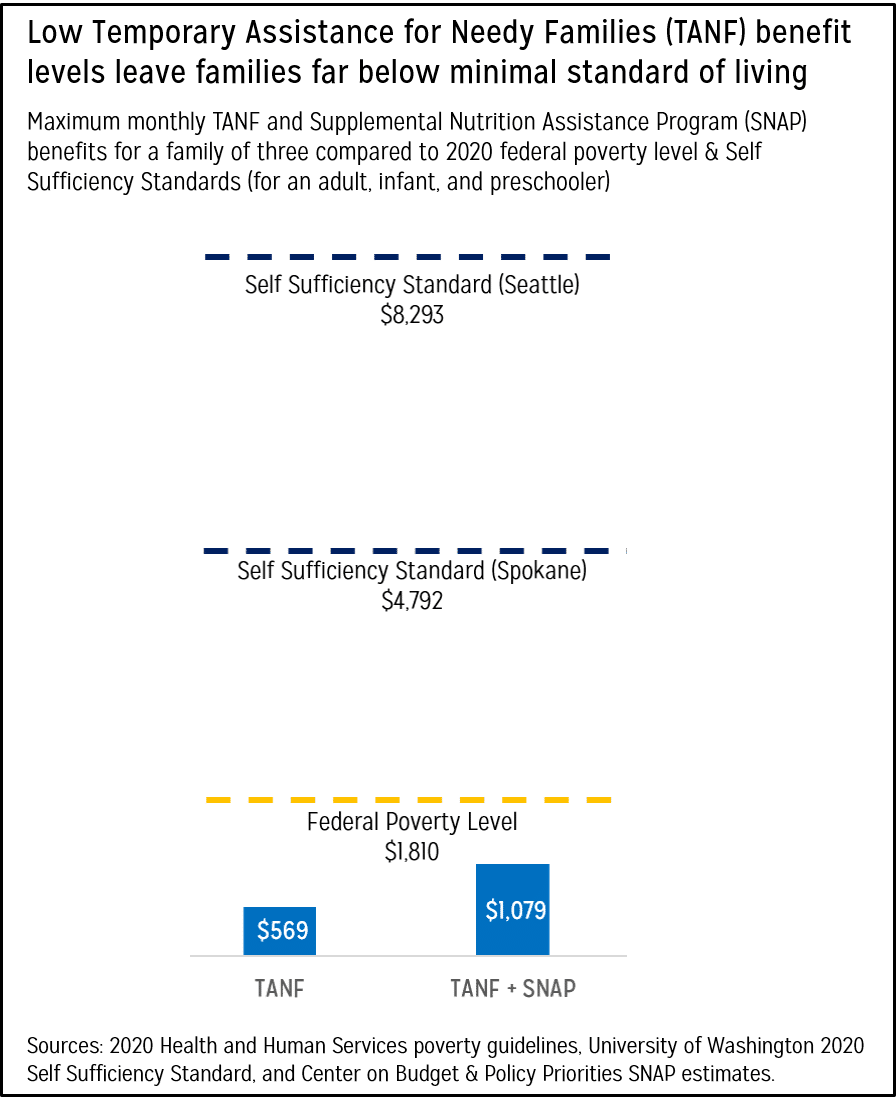When families fall on hard times, they deserve support to cover the basics – food on the table, a roof overhead, diapers and the other essentials kids need to be safe and healthy. Even before the onset of the COVID-19 pandemic, far too many families across our state were just a health scare or layoff away from profound financial insecurity. Now, in the midst of persistent economic crisis, growing numbers of Washingtonians are facing deeper hardship. This is especially true for Black, Indigenous, and people of color (BIPOC), people with low incomes, and families headed by women. These communities have been the most exposed to and least protected from the harms of COVID-19, largely due to past and persistent policy decisions, like lack of access to healthcare and discrimination in educational and employment opportunities, which uphold institutional racism.
In this context, Temporary Assistance for Needy Families (TANF)/WorkFirst is an increasingly essential lifeline. TANF, which includes the State Family Assistance (SFA) program (a state-funded counterpart that reaches some immigrants excluded from federally funded TANF benefits[1]),a core component of our state’s safety net. The program provides monthly, time-limited cash assistance and supportive services to kids and parents experiencing poverty and facing barriers to employment. It should be a safeguard against the traumatic effects of deep poverty and a backstop for families most impacted by the COVID-19 crisis. But TANF benefits have gone largely unchanged since the program’s inception in 1996, meaning the purchasing power of the grant has plummeted and more families receiving this assistance are facing homelessness and housing instability. In order for TANF to serve its essential purpose of protecting kids and families, Washington state lawmakers must take action this legislative session to significantly increase the cash grant.
Current TANF benefits fail to provide adequate support to help recipients meet their basic needs. Shockingly low benefit levels in Washington state and across the nation are rooted in a history of anti-Blackness and racism in TANF policy. They reflect violent, racist stereotypes about Black mothers and are informed by dog whistle narratives about “government dependency” (the false notion that families will languish on public programs if assistance is accessible and offered at a modest level). The result is a restrictive TANF program that emphasizes compliance with rigid program rules (which disproportionately harm BIPOC families) over and above ensuring parents have adequate resources to meet their kids’ needs. Increasing cash benefit levels is one important change state lawmakers can make immediately to begin to address the harmful impact of systemic racism in public benefit programs.
Washington’s TANF benefits leave families far below the federal poverty level, without enough to cover rent and other essential expenses
Currently, an eligible household of three with no other income can receive a maximum TANF grant of $569 per month. This totals an annual income of about $6,800, or just 31% of the federal poverty level ($21,960 for a family of three). Even TANF and Supplemental Nutrition Assistance Program (SNAP) benefits combined fail to lift families out of poverty (bringing those eligible to 60% of the federal poverty level). Washington state’s TANF benefits are an even smaller fraction of the Self Sufficiency Standard (a cost of living measure that more accurately reflects what it takes to make ends meet).Using this measure, TANF meets just 7% of a minimal household budget for a family of three (including one adult, one infant, and one preschooler) living in Seattle, and 11% of a minimal budget for a family of the same size living in Spokane.[2]

Since the federal program was enacted in 1996, state lawmakers have allowed Washington state’s TANF grant to lose 38% of its real, inflation-adjusted value. This means that the families relying solely on TANF to provide the basics for their children – when they’re experiencing illness, surviving domestic violence, or isolated from the workforce due to disability or discrimination – now have far less purchasing power than they did 25 years ago. At the same time that the value of Washington state’s TANF grant has plunged, the cost of living has skyrocketed in communities statewide.
In 2009 – the last time the Washington state legislature modestly increased TANF benefits (only to slash two years later during the Great Recession) – the cash grant for a family of three covered 81% of fair market rent for a two-bedroom apartment in Spokane.[3],[4] Now, TANF benefits cover just 57% of that same expense – with no money remaining for other basic expenses.[5] In every county across the state, the current TANF grant falls short of basic housing costs. This leaves families trying to scrape together rent for substandard housing, doubled up in a friend or family member’s home, or homeless. The cost of other basic goods not covered by other public benefits – diapers, clothing, school supplies, transportation, and more – has also increased steadily over time, in some cases rising sharply during the COVID-19 pandemic.

Lawmakers must invest in TANF to help families meet basic needs & promote a more equitable economic recovery
As the pandemic fuels ongoing job and income loss, hunger, and housing insecurity, Washington state lawmakers must increase investment in the TANF grant in our state budget. Boosting TANF benefit levels is necessary to help families in crisis afford the things that they need to be healthy right now and support children – who are nearly 75% of the TANF caseload – to thrive long-term. It’s an essential component of a just economic recovery. A stronger TANF program can help stabilize families most impacted by the crisis, including those nearing the limits of their modest savings or exhausting unemployment insurance benefits. When paired with other forms of direct cash assistance equipped to reach families excluded by TANF’s restrictive eligibility criteria – like a Recovery Rebate/updated Working Families Tax Credit and increased investment in the Washington Immigrant Relief Fund – more robust TANF benefits would help ensure that every family in our state can meet basic needs.
Now is the time for Washington state lawmakers to invest in this critical – but under-resourced – benefit and make good on the promise of TANF as an anti-poverty program. This session, policymakers must permanently and significantly increase the TANF cash grant in order to begin the necessary work to provide more equitable and effective support to families with the lowest incomes in our state.
